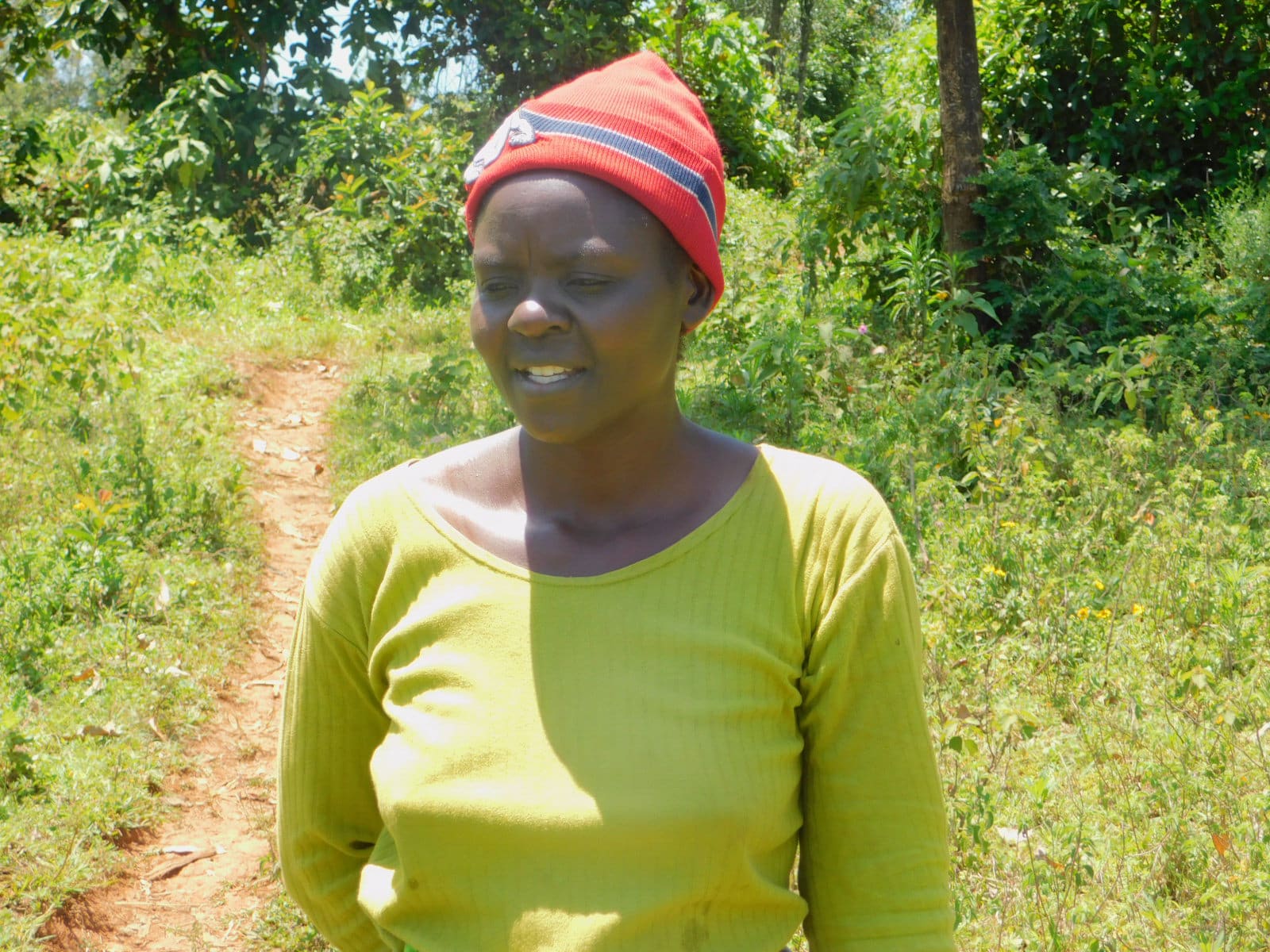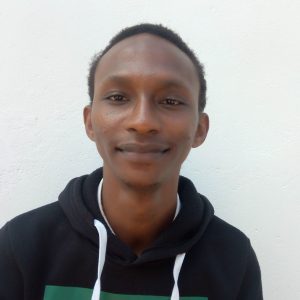Project Updates
July, 2020: Through Their Eyes: COVID-19 Chronicles with Catherine Waka
This post is part of a new series by The Water Project meant to highlight the perspectives and experiences of the people we serve and how the COVID-19 pandemic is impacting them. We invite you to read more of their stories here.
Catherine Waka is a 53-year-old farmer in Ataku Village. As a grandmother who lost her son and daughter-in-law, she now takes care of her 6 grandchildren, whom she simply refers to as her children.
Catherine also serves as the Treasurer of the Ngache Spring Water User Committee. With her grandchildren now at home, Catherine knows her family - and the young ones in particular - really benefit from the clean water of Ngache Spring.

Catherine works in her kitchen garden.
Our team recently visited Ataku to conduct a COVID-19 prevention training (read more about it below!) and monitor their water point. Shortly after, we returned to check in on the community, offer a COVID-19 refresher training, and ask how the pandemic is affecting their lives.

Catherine (right) asks a question at a COVID-19 prevention training in June.
It was during this most recent visit that Catherine shared her story of how the coronavirus has impacted her his life.
Team member David Muthama met Catherine outside her home to conduct the interview. Both David and Catherine observed social distancing and other precautions throughout the visit to ensure their health and safety. Their questions and answers have been edited for clarity and length.

Catherine meets David at the entrance to her homestead.
What is one thing that has changed in your community since the protection of Ngache Spring?
"One thing that has changed in my community is that we are now drinking clean, safe water. Even if you send a young child, you are sure to get clean, safe water from the spring, unlike before. Even animals could interfere with the water, and to a child there is no difference, water is water. I had to sieve it before using it. I am also grateful to your team who visit us from time to time; it's good to know we have people who think about us."

Catherine fetches water from Ngache Spring.
How has having a clean water point helped you through the pandemic so far?
"I can wash my hands every now and then since water is available in plenty. Even when it rains, the water still remains clean."


Catherine washes her hands with soap and water from Ngache Spring at the handwashing station she set up outside her home.
Since the outbreak of COVID-19 in Kenya, has fetching water changed for you because of restrictions, new rules, or your concerns about the virus?
"Yes, it has changed. I used to gather for stories at the drawing point and socialize for some time, mostly after I had finished all my chores. But as for now, I have to wait for one person to finish to fetch water, then after fetching go home - there's no crowding like before."

One of Catherine's granddaughters fetches water from Ngache Spring.
How has COVID-19 impacted your family?
"For my family, I am glad to be far away from the hotspots since no cases have been reported so far in Kakamega County. But as for my children, they can no longer go to school and this is affecting their self-esteem."

Catherine poses with 4 of her 6 grandchildren and her husband.
What other challenges are you experiencing due to the COVID-19 pandemic?
"I used to depend on small jobs that would help me sustain my family, but since the outbreak of COVID-19, it is very hard to come by such jobs, and if so, payment is always a problem. Times have become so hard for me."

Catherine quenches her animals' thirst with water from Ngache Spring.
What hygiene and sanitation steps have you and your community taken to stop the spread of the virus?
"There are no unnecessary visits to people's homesteads. Even if you are closely related, we no longer have the small meets like group meetings, burials, and drinking sprees like before. We are social distancing, even at the spring when fetching water; handwashing with soap at home as many times as possible to keep away the virus; wearing masks always, and if I forget mine I have to go back home and get it or buy one since it is mandatory to wear one whenever I am away from my home."

Catherine washes her hands with soap and water from Ngache Spring using a leaky tin handwashing station she set up outside her home.
Have any COVID-19-related restrictions been lifted since they began in Kenya?
"Yes."
What restriction were you most excited to see lifted already?
"Lockdown. I am happy that all the counties that were under lockdown are no longer locked since the president did that yesterday."

Catherine shows her homemade mask.
What restriction are you still looking forward to being lifted?
"The curfew from 9:00 pm to 4:00 am, and also being allowed to go back to church in large numbers. Now they are saying we only have 1 hour for church, and no singing; I am not happy about that."

Catherine puts on her mask.
When asked where she receives information about COVID-19, Catherine listed the radio, loudspeaker/megaphone announcements, word of mouth, short messages from mobile subscribers, and our team's sensitization training.

Catherine uses her shoe to help sweep plant stalks from the spring steps while her grandchildren wait their turn to fetch water.
What has been the most valuable part of the COVID-19 sensitization training you received from our team?
"Washing hands with clean water and soap. Honestly, we just knew washing hands is simple but through the training, we learned there are key areas to pay attention to."

May, 2020: COVID-19 Prevention Training Update at Ataku Community, Ngache Spring
Our teams are working on the frontlines of the COVID-19 pandemic. Join us in our fight against the virus while maintaining access to clean, reliable water.

Team Leader Emmah in mask and gloves leads training
We are carrying out awareness and prevention trainings on the virus in every community we serve. Very often, our teams are the first (and only) to bring news and information of the virus to rural communities like Ataku, Kenya.

Community members practice social distancing as a requirement of attending training
We trained more than 12 people on the symptoms, transmission routes, and prevention of COVID-19. Due to public gathering concerns, we worked with trusted community leaders to gather a select group of community members who would then relay the information learned to the rest of their family and friends.

Staff members wear full personal protective equipment and practice social distancing throughout training
We covered essential hygiene lessons:
- Demonstrations on how to build a simple handwashing station
- Proper handwashing technique
- The importance of using soap and clean water for handwashing
- Cleaning and disinfecting commonly touched surfaces including at the water point.

Handwashing demonstration with the new leaky tin
We covered COVID-19-specific guidance in line with national and international standards:
- Information on the symptoms and transmission routes of COVID-19
- What social distancing is and how to practice it
- How to cough into an elbow
- Alternative ways to greet people without handshakes, fist bumps, etc.
- How to make and properly wear a facemask.

Handwashing
During training, we installed a new handwashing station with soap near the community’s water point. Due to the rampant spread of misinformation about COVID-19, we also dedicated time to a question and answer session to help debunk rumors about the disease and provide extra information where needed.

Irine, Chair of the Water User Committee, demonstrates handwashing
We continue to stay in touch with this community as the pandemic progresses. We want to ensure their water point remains functional and their community stays informed about the virus.

Mr. Ingache listens in at training
Water access, sanitation, and hygiene are at the crux of disease prevention. You can directly support our work on the frontlines of COVID-19 prevention in all of the communities we serve while maintaining their access to safe, clean, and reliable water.

August, 2019: Ataku Community, Ngache Spring Project Complete!
Ataku Community now has clean water! Ngache Spring has been transformed into a flowing source of clean water thanks to your donation. The spring is protected from contamination, five sanitation platforms have been provided for the community, and training has been done on sanitation and hygiene.

Happy faces

"W" is for water!
Spring Protection
Community members provided all locally available construction materials, e.g bricks, wheelbarrows of clean sand, stones, and fencing poles. Accommodations and meals were provided for the artisan, too.

Community member brings stones, one at a time, to the construction site
The Process
Men and women lent their strength to the artisan to help him with manual labor. The construction process began by clearing the sugar-cane around the spring area so as to avoid contamination and also to clearly expose the eye. The spring area was then excavated to create space for setting the foundation of thick plastic tarp, wire mesh, and concrete.
After the base had been set, both wing walls and the headwall were set in place using brickwork. The discharge pipe was fixed low in place through the headwall to direct the water from the reservoir to the drawing area.

Preparing clay

Bricklaying
As the wing walls and headwall were curing, the stairs were set and ceramic tiles were fixed directly below the discharge pipe. This protects the concrete from the erosive force of the falling water and beautifies the spring. The process of plastering the headwall and wing walls on both sides reinforces the brickwork and prevents water from the reservoir from seeping through the walls and allows pressure to build in the collection box to push water up through the discharge pipe.

Cementing the headwall
The source area was filled up with clean stones and sand and covered with a plastic membrane to eliminate any potential sources of contamination. It took about two weeks of patience for the concrete to dry.

Almost done!
As soon as it was ready, people got the okay from our field officers to begin fetching clean water. We met them there to celebrate this momentous occasion. By the look on community members' faces, it seemed all were very happy with the new project.

Women arrive to see the completed project
'The community of Ataku Village is very glad [that] we are going to access safe drinking water...We believe there will be minimal cases [of] waterborne diseases and contamination from animals, and small children [are] no longer [at risk for] their health," said Mama Catherine Mandila Lukamasia.
Catherine is not only a farmer and caretaker in the village but she also now serves as the Treasurer of the spring's water committee.

Handing over ceremony with Field Officer David, Catherine (right), and another community member

Standing proud
Sanitation Platforms
All five sanitation platforms have been installed. These five families are happy about this milestone of having a private latrine of their own and are optimistic that people will no longer leave waste outdoors. We are continuing to encourage families to finish building walls and roofs over their new latrine floors.

Casting a sanitation platform
Catherine's family was one of the five families the community chose to receive a new sanitation platform.
"I really appreciate and give thanks to [you] for equipping my family and l in getting a sanitation platform," Catherine said.
"The condition [of] the previous toilet which my family and l were using was very uncomfortable to get in because the log for stepping on was very old and could have sunk in any time...Thanks to you, we now have dug a new pit and we shall have no shame to use it and [build] a superstructure. This is a new chapter for my family and l, and also for my guests."

Catherine and her family with their new sanitation platform
New Knowledge
Catherine Mandila Lukamasia, the treasurer of the spring's water committee, was tasked with organizing the training. She gave us the community’s preferred date for training, for she was very much aware of the community calendar when it comes to planting season and other big events.

Questions arise at training
Some 28 people showed up for training, 24 of whom were women. This was a strong showing, demonstrating the community's interest in their new water point and their commitment to improving their sanitation and hygiene.
The training took place at Mzee Ngache's homestead under a tree, where the community members came together for the afternoon. This place was the best location because it was a central place for the community members and the home was only about 100 meters from Ngache Spring.

Trainer Protus in action
We covered several topics including leadership and governance; operation and maintenance of the spring; healthcare; family planning; immunizations; and the prevention and spread of disease. We also covered water treatment methods, personal care like handwashing, environmental hygiene, hygiene promotion, and many other things.

Trainer Lynnah leads a handwashing activity
There was active participation during the entire training, whether community members were asking and answering questions from the facilitators, or from other participants. There was a good discussion among participants during the personal and environmental hygiene sessions in particular, with people volunteering examples of how they try to maintain hygiene in their personal lives.

Group discussion

Site management training
Live demonstrations of the different training topics helped a majority of the participants present to realize that they had been doing things like handwashing and toothbrushing incorrectly. Questions about what to do if one cannot afford to buy toothpaste or a new toothbrush even prompted a discussion on using thread instead, being gentle so as to not hurt or damage the gums and teeth.

Community member responds to a question
'This training today has enabled me to learn [a lot] such as the way to wash my hands using the ten steps of [handwashing]," said Dinah Khakali, a stay-at-home mom in the village.
"Not only that, I have learned germs do hide between my fingers and in the nails."
Thank you for making all of this possible!

July, 2019: Ataku Community, Ngache Spring Project Underway
Dirty water from Ngache Spring is making people in Ataku Community sick. Thanks to your generosity, we’re working to solve this issue by building a clean water point and much more.
Get to know this community through the community profile and pictures we’ve posted, and learn more about this water, sanitation, and hygiene project. We look forward to reaching out soon with news of success!



 Protected Spring
Protected Spring
 Rehabilitation Project
Rehabilitation Project































































